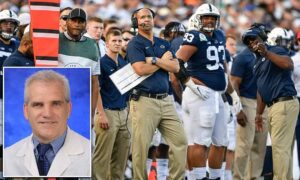
Breaking Today: Penn State Coach Sheds Light on Key Player Absences, Offers Insight Into Squad Rotation Strategy

In today’s breaking news from the Penn State football camp, head coach James Franklin has addressed the recent absence of several key players, offering detailed insight into the team’s rotation strategy and overall approach to player management. With fans raising questions about the surprising omissions from recent lineups, Franklin took the opportunity to clarify the reasoning behind these tactical decisions.
The coach’s remarks came during a media session following a closed practice, where speculation had swirled about the absence of some of the team’s usual starters. While injuries are often the assumed cause in such situations, Franklin was quick to assure reporters and fans alike that this time, the absences were primarily due to planned rotation decisions rather than any long-term fitness concerns.
“We’re in a stretch of the season where managing the squad is critical,” Franklin explained. “This isn’t just about who’s the best player — it’s about who’s freshest, who fits the game plan, and how we can get the most out of our depth. We’ve got a lot of talented guys on this roster, and we need to keep them engaged and ready.”

The comments have brought some clarity to the recent lineup changes that puzzled supporters during the last two games. Several core players — including standout performers from earlier in the season — were either benched or left out entirely, leading to concern among fans and analysts. However, Franklin emphasized that the coaching staff is thinking long-term, with postseason aspirations driving the decision to rotate and rest players at key intervals.
“We’ve got to play smart,” Franklin continued. “We’ve seen what burnout and fatigue can do to a team late in the season. Our job is to make sure our players are peaking when it matters most. That sometimes means giving others a chance earlier in the year.”
While Franklin stopped short of naming every player affected by the current rotation policy, he did highlight that the approach is not a one-size-fits-all formula. Instead, it involves data analysis, performance tracking, and even input from the players themselves.
“You’ve got to trust your staff, trust the data, and, more importantly, trust your guys,” he said. “They know their bodies, and we listen when someone says they’re not 100 percent. That honesty helps us make better decisions.”
Reactions from players have so far been supportive, with several team leaders expressing confidence in the coach’s system. Backup players have also welcomed the increased opportunities to prove themselves, with some stepping up impressively when called upon.
As Penn State continues its push for a top-tier bowl game and possible playoff contention, Franklin’s strategic choices may prove decisive. His willingness to rotate and manage the squad carefully is a sign of a coach looking beyond just the next game — he’s preparing for the full campaign.







